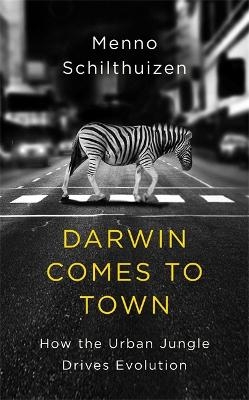
Darwin Comes to Town
Seiten
2018
Quercus Publishing (Verlag)
978-1-78648-110-8 (ISBN)
Quercus Publishing (Verlag)
978-1-78648-110-8 (ISBN)
- Titel ist leider vergriffen;
keine Neuauflage - Artikel merken
See your city through fresh eyes
We are marching towards a future in which three-quarters of humans live in cities, and a large portion of the planet's landmass is urbanized. With much of the rest covered by human-shaped farms, pasture, and plantations, where can nature still go? To the cities -- is Menno Schilthuizen's answer in this remarkable book. And with more and more wildlife carving out new niches among humans, evolution takes a surprising turn. Urban animals evolve to become more cheeky and resourceful, city pigeons develop detox-plumage, and weeds growing from cracks in the pavement get a new type of seeds. City blackbirds are even on their way of becoming an entirely new species, which we could name Turdus urbanicus.
Thanks to evolutionary adaptation taking place at unprecedented speeds, plants and animals are coming up with new ways of living in the seemingly hostile environments of asphalt and steel that we humans have created. We are on the verge of a new chapter in the history of life, Schilthuizen says -- a chapter in which much old biodiversity is, sadly, disappearing, but also one in which a new and exciting set of life forms is being born.
Menno Schilthuizen shows us that evolution in cities can happen far more rapidly, and strangely, than Darwin had dared dream.
We are marching towards a future in which three-quarters of humans live in cities, and a large portion of the planet's landmass is urbanized. With much of the rest covered by human-shaped farms, pasture, and plantations, where can nature still go? To the cities -- is Menno Schilthuizen's answer in this remarkable book. And with more and more wildlife carving out new niches among humans, evolution takes a surprising turn. Urban animals evolve to become more cheeky and resourceful, city pigeons develop detox-plumage, and weeds growing from cracks in the pavement get a new type of seeds. City blackbirds are even on their way of becoming an entirely new species, which we could name Turdus urbanicus.
Thanks to evolutionary adaptation taking place at unprecedented speeds, plants and animals are coming up with new ways of living in the seemingly hostile environments of asphalt and steel that we humans have created. We are on the verge of a new chapter in the history of life, Schilthuizen says -- a chapter in which much old biodiversity is, sadly, disappearing, but also one in which a new and exciting set of life forms is being born.
Menno Schilthuizen shows us that evolution in cities can happen far more rapidly, and strangely, than Darwin had dared dream.
Menno Schilthuizen is a Dutch evolutionary biologist, ecologist, and permanent research scientist at Naturalis Biodiversity Center in Leiden and a professor in character evolution and biodiversity at Leiden University, The Netherlands. He has published numerous articles about evolution and ecology and three popular science books.
| Erscheinungsdatum | 03.02.2018 |
|---|---|
| Verlagsort | London |
| Sprache | englisch |
| Maße | 158 x 236 mm |
| Gewicht | 500 g |
| Themenwelt | Naturwissenschaften ► Biologie ► Evolution |
| Technik ► Architektur | |
| ISBN-10 | 1-78648-110-3 / 1786481103 |
| ISBN-13 | 978-1-78648-110-8 / 9781786481108 |
| Zustand | Neuware |
| Haben Sie eine Frage zum Produkt? |
Mehr entdecken
aus dem Bereich
aus dem Bereich
Wie die Vernichtung der Arten unser Überleben bedroht - Der …
Buch | Softcover (2023)
Penguin (Verlag)
15,00 €


